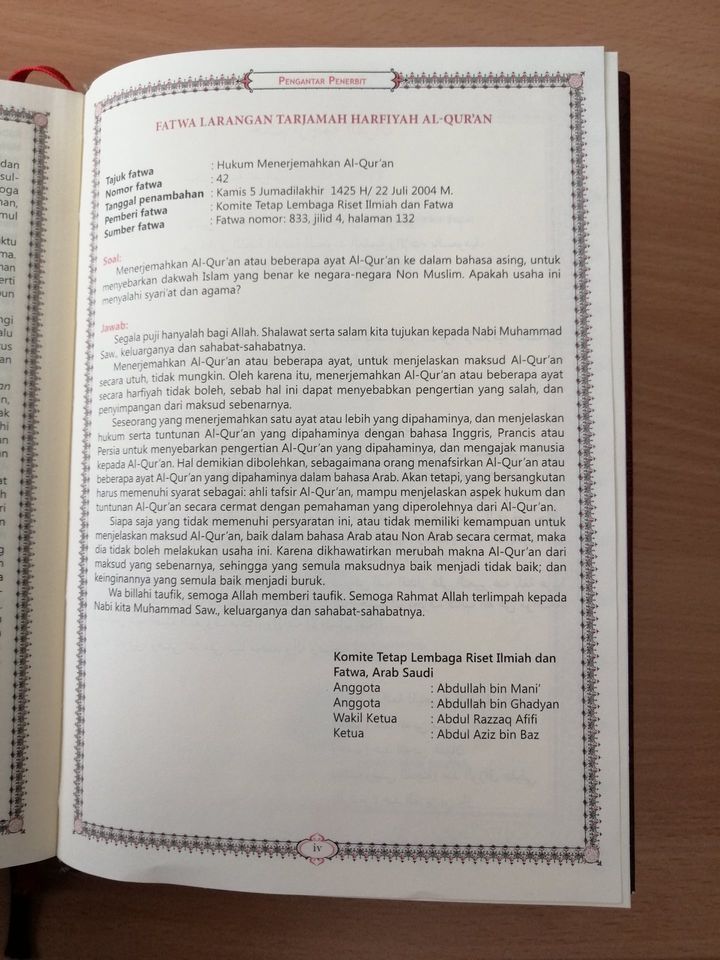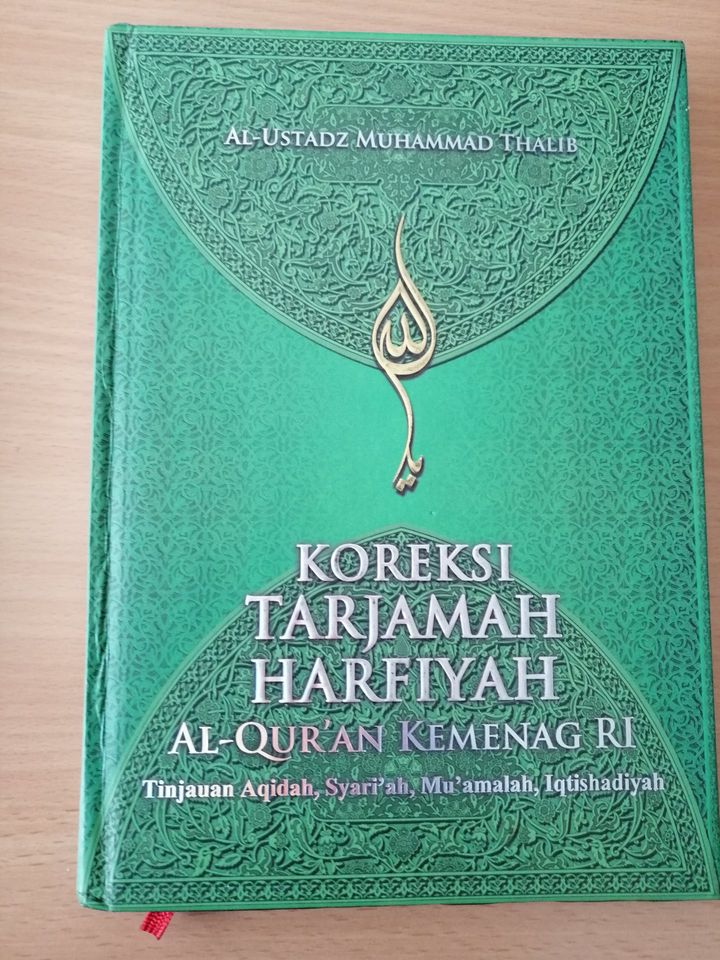Muhammad Thalib’s “exegetical translation”, first published in 2011, is not so much a translation as it is a counter-translation. It constitutes a direct attack on the religious legitimacy of the Indonesian government, which publishes its own Qur’an translation. That translation, much to Thalib’s discontent, dominates the Indonesian market (see https://gloqur.de/quran-translation-of-the-week-01-al-quran-dan-terjemahnya/). Consequently, criticizing the government translation implies an attack on the authority of the state, as Munirul Ikhwan has shown in his paper on Muhammad Thalib’s translation in the Journal of Qur’anic Studies (https://www.euppublishing.com/doi/abs/10.3366/jqs.2015.0214).
Muhammad Thalib (b. 1948) is the leader of the Majelis Mujahidin Indonesia, an Islamist organization. Indonesian Islamists have a long-standing quarrel with the government ever since the first president, Sukarno, removed the famous “seven words” from the draft constitution in 1945; these contained an obligation for Muslims to adhere to the sharia. Majelis Mujahidin Indonesia was founded with the aim of reinstating this clause to the constitution and introducing the sharia in Indonesia. This happened in 2000, after the fall of Suharto and a process of democratization that made it possible to openly voice such claims.
MMI has been compromised by the fact that members of their early leadership were later connected to terrorist activity in the country and affiliated with al-Qa’ida. Its later leadership, including Muhammad Thalib, protested the association of their organization with any kind of violent activism. Their publishing activities are part of an effort to frame their activities as respectable and scholarly.
Alongside his “exegetical translation”, Thalib published a “correction of the literal translation” by the Ministry of Religious Affairs. Listing hundreds of “errors”, he even accused that translation of promoting terrorism by rendering the Qur’anic text literally, without the exegetical explanations that he considered indispensable. Translators should, for example, specify the historical context in which jihad in the sense of armed warfare is legitimate, he argued. His hermeneutical project is part of a fierce ideological debate in Indonesia on the merits of “literal” (harfiyah) versus “exegetical” (tafsiriyah) translation. Interestingly, it is often Salafis, typically credited with a literal understanding of the Qur’an, who demand an exegetical translation. In the extensive introduction to his translation, Thalib even quotes a Saudi fatwa that prohibits “literal” translations. They invite misunderstandings, he claims, and confuse Muslims. Therefore, translators should always provide the “correct” interpretation of a verse.
For example, Q 11:108 promises the “felicitous” (alladhīna suʿidū) eternal paradise, “except what your Lord may wish” (illā mā shāʾa rabbuka). The government translation renders this succinctly, but with a small exegetical addition, as “except if your Lord wishes (otherwise)” (kecuali jika Tuhanmu menghendaki [yang lain]). Muhammad Thalib considers this insufficient. He claims that this translation leads readers to believe that God acts according to His whims, without regard for justice. Instead, he says, the verse refers to the fact that for some believers, hellfire might not be eternal. He bases this argument on the Saudi concise Qur’anic commentary “al-Tafsīr al-Muyassar” and gives a lengthy Indonesian translation of the four Arabic words: “But there are people who have already completed their term of punishment in hell and then enter paradise according to the will of your Lord.” (Tetapi ada orang-orang yang telah selesai menjalani adzab neraka kemudian masuk surga sesuai kehendak Tuhanmu.)
Thus, Thalib’s translation is extensive and not interested in closely following the structure of the source text. Rather, it delivers an interpretation. It also provides an additional interpretive structure by adding thematic headers.
As Munirul Ikhwan has shown, a pet peeve of Thalib’s is his insistence that the Ministry glosses over negative portrayals of Judaism in the Qur’an. He himself uses his exegetical method of translation in order to promote an exclusivist reading, which is particularly controversial in the Indonesian context where religious tolerance and pluralism are frequently promoted. For example, Thalib translates the last two verses of the Fatiha (Q 1:6-7; “Guide us on the straight path; the path of those whom You have blessed, not those who have incurred wrath, nor are astray”) as
“Guide us towards Islam (6), that is, the religion followed by those whom You have blessed with the guidance of Islam before their death, not the religion of the Jews who are despised by God, and also not the religion of Christians who reject the prophethood of Muhammad (7).”
This translation is based on a well-known exegetical hadith that is contained in most premodern Qur’anic commentaries. However, many contemporary translators and exegetes choose not to base their interpretation on it for various reasons, including its hostility towards pre-Islamic religions and also due to the fact that it narrows down a universal statement in the Qur’an to a very particular meaning, which seems like an unnecessary specification to many interpreters, especially given that the first sura in the Qur’an is supposed to cover the most fundamental and general tenets of faith. Thalib, conversely, considers any omission of this hadith a falsification of the meaning of the Qur’an.
This points to a fundamental controversy over the role of exegetical traditions in the interpretation and translation of the Qur’an. It also clearly shows the inherent potential of politicizing that controversy, either by claiming to recover the “literal meaning” or by claiming to provide the “correct interpretation”.
Johanna Pink




